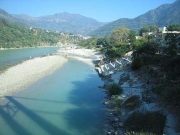 This document in two volumes deals with the Environmental and Social Management Framework (ESMF) of National Ganga River Basin Authority (NGRBA). The Government of India (GOI) has established NGRBA for the comprehensive management of the river with the mandate of addressing both water quantity and quality aspects, through a multi-sector, river-basin approach. The NGRBA has resolved that by year 2020 no untreated municipal sewage or industrial effluents will be discharged into River Ganga.
This document in two volumes deals with the Environmental and Social Management Framework (ESMF) of National Ganga River Basin Authority (NGRBA). The Government of India (GOI) has established NGRBA for the comprehensive management of the river with the mandate of addressing both water quantity and quality aspects, through a multi-sector, river-basin approach. The NGRBA has resolved that by year 2020 no untreated municipal sewage or industrial effluents will be discharged into River Ganga.
The NGRBA has received significant authority over regulatory and developmental matters, including the power to develop river-basin management plans and facilitate their implementation. The NGRBA has a detailed implementation structure, supported by the GoI. At the state level, State Ganga River Basin Authorities (SGRBA’s) have been proposed.
Environmental and Social Management Framework (ESMF)
This Environmental and Social Management Framework (ESMF) aims to facilitate the management of environmental and social issues of the investment project proposed by the NGRBA under a proposal submitted to the World Bank for an initial investment of approximately US $ 1 billion. The ESMF currently only addresses the broader portfolio of projects to be implemented under the NGRBA, as relevant information for specific projects (i.e. their size, type and location) are either not yet available or are currently being prepared.
As specific project identification will operate as a demand-driven process, a single ESMF common to the NGRBA, the SGRBAs and all other project implementing agencies will be required. Through their use of an ESMF, the SGRBAs and NGRBA will incorporate international best practices for managing social & environment issues of sub-projects using an explicit management framework.
The areas where the NGRBA requires cooperation and/or assistance from the World Bank include:
- Creation of sewerage infrastructure in pollution hotspots and other important towns along the Ganga;
- Industrial pollution control, such as setting up of common effluent treatment plants, action plans for industrial hotspots, etc;
- Strengthening of State Pollution Control Boards for better compliance and enforcement;
- Water conservation in the agriculture sector, industrial sector, and municipalities in order to increase flows. Efforts will include reuse and recycle of treated water and rainwater harvesting;
- Developing decentralised treatment systems;
- Promotion of energy efficiency;
- Revamping of Water Quality Monitoring Programme;
- Support for river front development;
- Implementation of solid waste management system (for both Industrial and Municipal sectors);
- Capacity building for the NGRBA executives;
- Promotion of relevant research and development.
The current ESMF document is intended to help manage the social and environmental impacts through appropriate measures during the planning, design, construction and operation of various sub-projects of NGRBA. The framework identifies the level of safeguard required for all categories of sub-projects of NGRBA and provides specific guidance on the policies and procedures to be followed for environmental and social assessment along with roles and responsibilities of the implementing agencies.
The ESMF has been divided into two volumes -
Volume I: Environmental and Social Analysis which comprises the following sections -
- Project Description
- Ganga Basin Profile
- Ganga Basin - Pollution Aspects
- Initiatives of GOI
Volume II: Environmental and Social Management Framework and comprises the following sections:
- Project Description
- Environmental Impacts
- Social Impacts
- Environmental and Social Regulatory Framework
- Environmental Management Framework
- Social Management Framework
- Project Appraisal, Monitoring and Reporting Arrangements
- Institutional Arrangements
- Training and Capacity Building
- Budgetary Support.
- Updation/ maintenance of the ESMF
Download the report here -